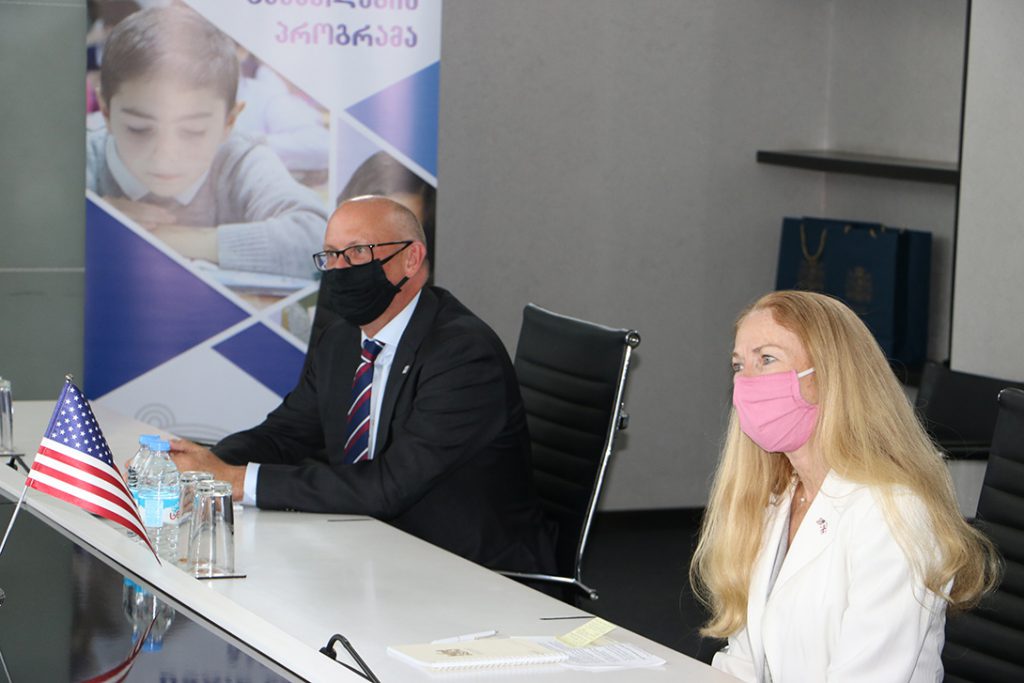Georgian education system taking important steps forward with USAID support
As Georgian students across the country returned to school this September both online and in person, USAID accelerated work under its new Basic Education Program: a four-year initiative to promote student-centered education in primary grades across the country and help young people gain the knowledge, skills, and critical thinking needed to grow into successful professionals and engaged, responsible citizens.

Education reform is a priority under USAID’s new strategy for supporting Georgia’s development, a point stressed by USAID/Georgia Mission Director Peter Wiebler:
“A modern, student-centered education system will help Georgia advance toward all three key goals expressed in our new strategy – helping Georgia build resilience to malign influence, supporting citizen-centered democracy, and enabling economic growth that results in higher paying jobs for workers, families, and communities.”
USAID developed the program in partnership with Georgia’s Ministry of Education, Science, Culture, and Sport, designing activities to support the Government of Georgia’s ongoing efforts to reform the country’s education system.
This kind of partnership exemplifies USAID’s new strategy of empowering Georgian society to lead its own development agenda.
“Both Georgia and the United States recognize that USAID assistance is an investment in Georgia’s self-reliant future. Where possible, we are co-creating, cost-sharing, and co-investing with our Georgian partners, both public and private, to help Georgia create its own solutions to development challenges,” Wiebler says.
Advancing student-centered education in more than 2,000 schools
In September, the program began a month-long “Training of Trainers” course for 112 trainers from eight partner universities and two NGOs. The course, conducted remotely to comply with COVID-19 regulations, gave the trainers access to student-centered education curricula and methodologies, and new skills to be transferred to teachers and school administrators across Georgia.
Over the next four years, the trainers will work with school administrators and primary grade teachers in 2,075 public schools across Georgia, helping design and deliver interactive curricula focused on literacy, numeracy, problem solving, and critical thinking skills.
The trainers will also help schools develop instructional methods to better meet the educational needs of girls, ethnic minorities, and children with disabilities, ensuring that young people from all backgrounds have opportunities to contribute to Georgia’s social and economic development.
In addition to helping primary grade students improve their literacy and numeracy skills, USAID is helping Georgia empower its emerging generation of active and responsible citizens.
Empowering Georgia’s ‘future generation’ to build a citizen-centered democracy
Georgia is home to a vibrant civil society, but many communities lack platforms for civic engagement, especially among youth. For the country to continue advancing toward a citizen-centered democracy – one where communities are cohesive and resilient, and where all citizens are engaged in the development journey – a more civically active young generation is needed.
USAID is empowering Georgia’s youth through its Momavlis Taoba (“Future Generation”) program, a partnership with the Ministry of Education, Science, Culture and Sport of Georgia, civil society organizations, and education professionals that promotes civic education in schools, with a focus on rural communities.
In addition to advancing civic education curriculum development, the program provides small grants allowing student-led civics clubs to plan and implement their own community activities.
The program has been a resounding success. At the time of writing, it has supported civics education in roughly 60% of Georgia’s secondary schools. Civics club members across the country have also made tangible impacts in their communities, including helping their neighbors stay healthy and safe during the COVID-19 pandemic.
Strengthening the rule of law through education
Rule of Law is another major priority under USAID’s new five-year development strategy for Georgia.
Georgia’s next generation of lawyers will play an important role in building a truly independent, transparent, and accountable legal system that ensures equal rights protections for all Georgians. That’s why support for the Rule of Law, and for enhanced legal education, is a key element of USAID’s new development strategy for Georgia.
Despite the challenges of COVID-19, USAID has recently taken important steps to empower Georgia’s future lawyers. With technical assistance from USAID’s Promoting Rule of Law in Georgia (PROLoG) Program, Georgia’s National Center for Educational Quality Enhancement adopted new standards for the accreditation of law programs. The standards, which are aligned with EU best practices, increase the minimum knowledge and competencies that law students must acquire, resulting in a more qualified class of young lawyers.
In 2020, USAID funding made it possible for the Georgian Law Institute to develop professional internship programs at law schools in Batumi, Kutaisi, and Akhaltsikhe, providing law students in Georgia’s regions the opportunity to gain valuable professional experience. USAID also empowered the next generation of lawyers through nationwide moot court competitions in legal ethics, client counseling, and administrative law, and by supporting human rights and legal ethics clinics that allowed 60 law students to develop their skills by working on real-life cases.
USAID also focuses on advancing legal ethics and human rights education in Georgian law schools. This year, PROLoG supported the establishment of a new human rights chair at Sulkhan-Saba Orbeliani Teaching University (SabaUni) in Tbilisi. SabaUni will now promote the teaching of human rights law in undergraduate and graduate programs in Georgia’s regions, developing course curricula on anti-discrimination law, equal rights protection, and disability law. The new chair will complement the long-standing work of the human rights chair at Ilia State University and the legal ethics chair at New Vision University, USAID-supported institutions that have raised awareness and increased legal education standards at universities across Georgia.
Catalyzing economic growth through workplace learning
Learning is a lifelong process that continues far beyond the classroom. Through an innovative workforce pipeline initiative, the USAID Economic Security Program is creating opportunities for young professionals and catalyzing growth in four key sectors: intellectual services, light manufacturing, creative industries, and tourism.

Georgia needs workers with the right set of skills for these sectors to reach their potential as drivers of long-term economic growth and sources of high-value employment. To ensure the workforce is more appropriately skilled, the USAID Economic Security Program is partnering with the Institutional and Capacity Development Center (ICDC) on a paid internship program to help companies build relationships with young professionals, and equip them with the skills they need to succeed.
The ICDC will recruit and place 100 students into three-month paid internships to provide administrative, marketing, and technological support to MSMEs in Tbilisi as well as Imereti, Adjara, Samegrelo, and Shida Kartli. The program is customized to meet the specific needs of each participating business. As a result of this partnership, USAID is catalyzing economic growth in two ways – supporting the growth of individual businesses while helping young professionals gain invaluable on-the-job training. USAID’s partnership with the ICDC is only the first step in advancing Georgia’s skills development with a focus on economic growth. USAID is currently developing a new, fully private-sector oriented, industry-led skills development program scheduled to go online in 2021.
About USAID in Georgia: As the leading development agency of the U.S. Government, USAID supports Georgia to build the capacity to plan, finance, and implement its own solutions to development challenges. USAID has worked in Georgia since 1992, supporting the country’s transformation into a developing democracy that is increasingly integrated into Western political, security, and economic institutions. More than 35 USAID programs strengthen Georgia’s resilience to malign influence, consolidate democratic gains through enhanced citizen responsive governance, and enable high-value employment through increased economic growth. For more information, please visit: https://www.usaid.gov/georgia.
____________________________ ADVERTISEMENT ____________________________


